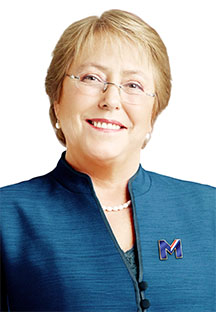VINA DEL MAR, Chile (Reuters) – Chile said yesterday it will create one of the world’s largest marine conservation parks, and Washington announced two new marine sanctuaries and an increased drive against illegal fishing to help protect the world’s oceans.
Addressing the second annual “Our Ocean” conference in the coastal town of Vina del Mar, Chilean President Michelle Bachelet said the protected area would include remote Easter Island, part of Chile’s territory some 3,800 km (2,361 miles) west of the capital Santiago in the middle of the Pacific Ocean.

The inhabitants of the island, the Rapa Nui, say they have been petitioning the government for years for more protection of fishing stocks, to guard against the overfishing of species such as tuna and swordfish.
A separate park will protect other island chains, including the Pacific’s Juan Fernandez archipelago, where disputes have arisen between commercial and artisanal fishermen.
“Its creation allows us to protect the biodiversity and richness of the sea surrounding the islands,” said Felipe Paredes, the mayor of Juan Fernandez, famous for being the site where the sailor said to inspire Daniel Defoe’s Robinson Crusoe was marooned in the 18th century.
Together, the parks host one of the highest densities of indigenous marine species on the planet and will cover around 1 million square km (386,100 square miles) of ocean, Bachelet said.
“This is Chile’s contribution to the ocean, so that our children and grandchildren may enjoy what we are doing here,” Bachelet told attendees.
Meanwhile, in the United States, two marine sanctuaries will be created in Maryland and in Lake Michigan off Wisconsin, US President Barack Obama said in a video address to the conference.
The proposed US sites – a 14-square-mile (36-square-km) section in the Mallows Bay-Potomac River waters of Maryland and an 875-square-mile (2,265-square-km) portion of Lake Michigan – will be the first new national marine sanctuaries declared by the US government since 2000.
He said he was scouting out more sites.
“We also have plans in the works for yet another significant (park) in the Atlantic, and we’re working with senators engaged in that particular area to make that happen,” US Secretary of State John Kerry told the conference.
Kerry also said negotiations were underway on a new marine-protected area arrangement between sites in Cuba and the United States in which the two former Cold War-era rivals will share scientific research data.
Growing illegal and unregulated fishing was a major issue the US wanted to tackle, Kerry said. “There is literally too much money chasing too few fish,” he said, adding: “We have to make illegal fishing harder to get away with.”
He said the United States would launch Sea Scout, a new global initiative to prosecute illegal or unregulated fishing networks around the world.
The United States will also begin tracking seafood from harvest or production to market entry, starting with species considered to be most at risk of being caught illegally or mislabeled, Kerry said.
The United States will also launch pilot projects in the Philippines and Indonesia to turn ocean waste into energy, Kerry said.
The National Oceanic and Atmospheric Admin-istration will provide data and technical assistance, including a space-based monitoring sensor.
And the European Union will seek to increase its marine-protected areas from 6 per cent of EU territorial waters to 10 per cent by 2020, said Karmenu Vella, European commissioner for the environment, maritime affairs and fisheries.









